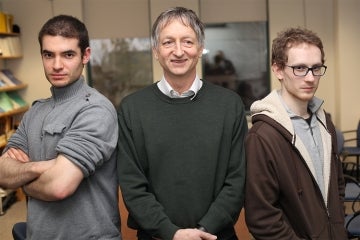U of T grad – and celebrated slam poet – champions environmental science

Hannah Flores, who is graduating with an honours degree in forest conservation science, plans to conduct field work in the Peruvian Amazon as part of her U of T graduate studies (photo by Polina Teif)
Published: May 30, 2025
Curious and full of questions about everything at home, Hannah Flores was painfully shy in elementary school. Her mother and grandmother nudged her towards books – and she quietly mined the local library in Markham, Ont., to learn about dinosaurs, plants and the human body.
Then, in Grade 6, her teacher showed the class videos of a slam poetry competition.
“I pointed at the screen and said, ‘I want to do that,’” Flores recalls. “I was so captivated by them and the passion they brought to the stage. Even though I didn’t understand exactly what it was, I could tell it was something I wanted to do.”
She later joined the school’s slam poetry team, discovering that she had a lot to say – especially about the challenges of being biracial – and went from being terrified to do class presentations to acing live competitions.
But she remained curious about science and the natural world. Today, she’s an award-winning slam poet who is poised to graduate from the University of Toronto with an honours bachelor of science degree with a major in forest conservation science.
She says her “double life” is helping her in ways she couldn’t have anticipated.
“I can use my skills as a poet to communicate science,” says Flores, a member of New College. “Important issues on a scientific level resonate on an artistic level. Getting to people’s emotions is what gets people to care.”
Flores’s artistic work often draws on her experience growing up in a family that traces its roots in Guyana and Cuba. Identifying as Black and Latina, she says she was often unsure where she fit in either culture. In particular, she was self-conscious about her lack of fluency in Spanish, which she says many see as essential in that community.
In 2020, she began making videos – including “The Only Black Person in the Room” as a letter to herself about imposter syndrome – that began to garner notice. The following year she was selected for the Toronto Raptors’ Toronto Creators Program and the 17-year-old was suddenly meeting a bunch of new people and making videos with a proper crew, not just her phone.
“My life changed overnight,” she says.
Yet, through all of it, science continued to exert its steady gravitational pull.
“I was fascinated by nature, but also our role as humans intertwined with the environment,” she says.
Upon arriving at U of T, she enrolled in life sciences but soon switched to studying forestry, noting the Amazon rainforest’s impact on her mother’s family in Guyana and the value of the fruit trees on the farm that belongs to her father’s family in Cuba. “Forestry might seem very niche, but it’s not. We depend on forests to survive, no matter where you are in the world,” she says. “Pursuing forestry expanded this view so much by giving me a systems design way of thinking, where the environment, society and the economy intersect.”
She began publishing papers, too. She co-authored one about the impact of medicine donations based on WHO guidelines in a peer-reviewed journal and her inventory of the trees along Philosopher’s Walk on U of T’s St. George campus was published in the 2023-24 Arbor Journal for Undergraduate Research. Flores also took on roles with U of T’s President's Advisory Committee on the Environment, Climate Change, and Sustainability and at National Geographic Society, among others.
The accolades soon followed: a Rising Star award from the 2024 Women Empowerment Awards and a Top 25 Environmentalists Under 25 by The Starfish in 2025.
This fall, Flores is set to begin a master’s degree in geography at U of T, where she will be working with Christian Abizaid, an associate professor in the department of geography and planning and the School of the Environment.
Abizaid says he was impressed by Flores’s passion and the fact that, as an undergraduate student, she was already the first author on a published paper in an international journal. “I almost fell of my chair when she explained the research she did for publication as a work-study student,” he says.
As part of her master’s studies, Flores will conduct field work in the Peruvian Amazon, studying access to clean water and water-borne illnesses – work she finds “culturally satisfying” given the similarities between Peru’s climate and Guyana’s. Plus, she will be able to conduct interviews in Spanish, which she can now speak fluently thanks to electives she took as part of her undergraduate degree.
“I feel like my career in science is finally catching up to my poetry.”



